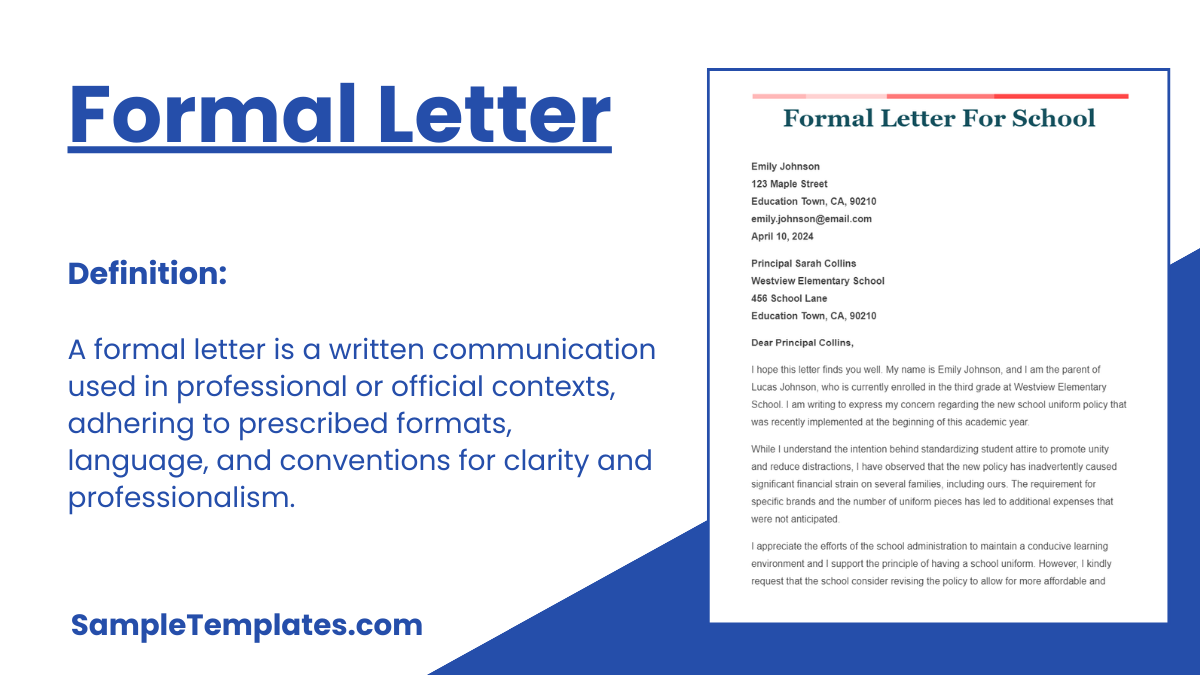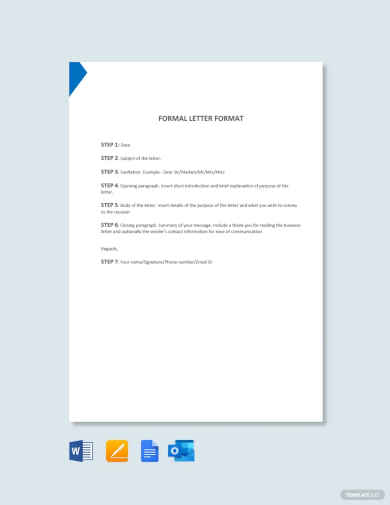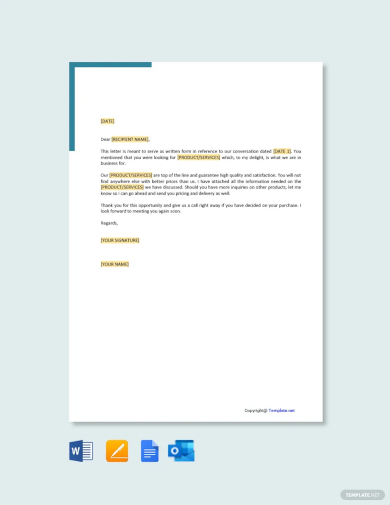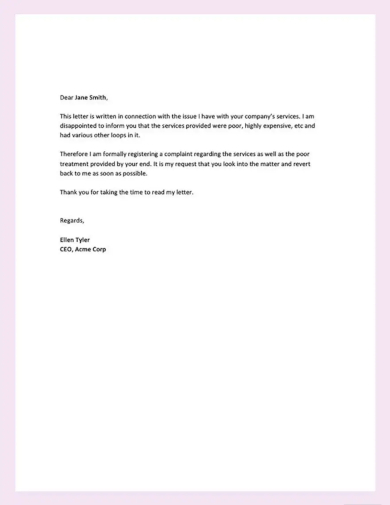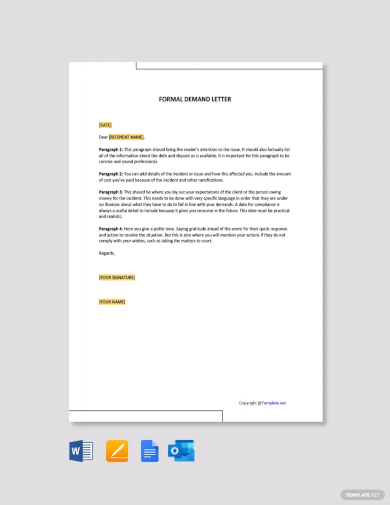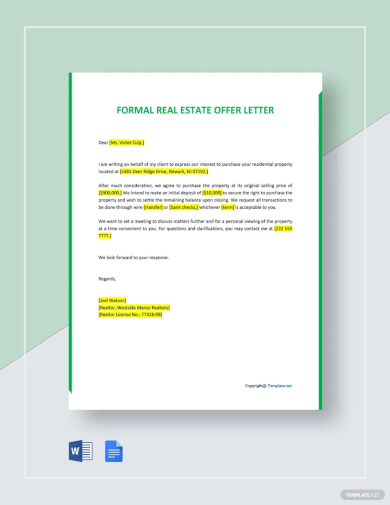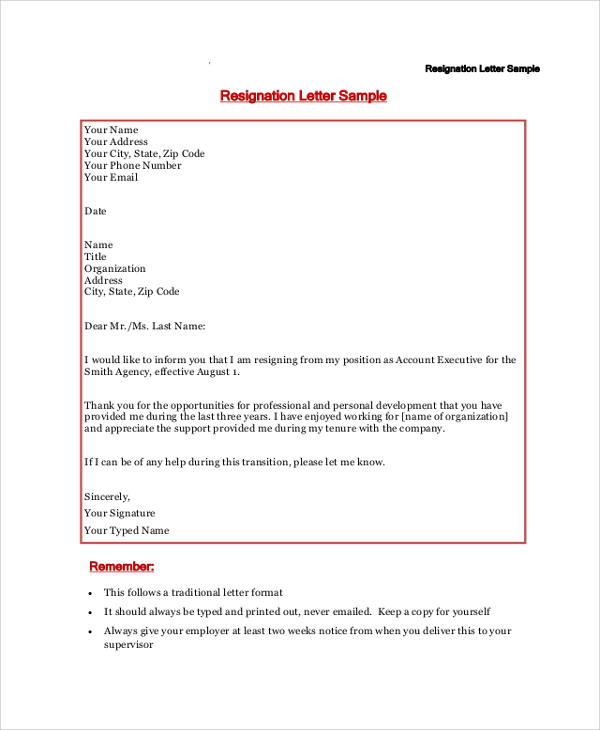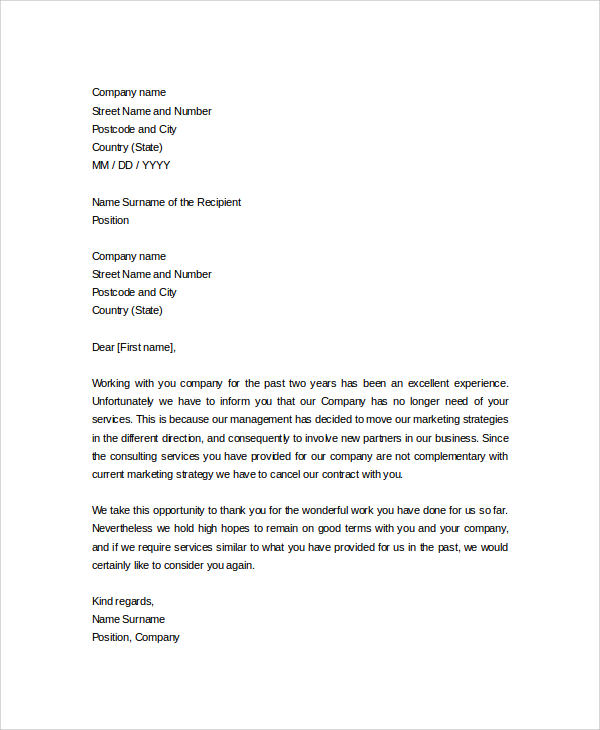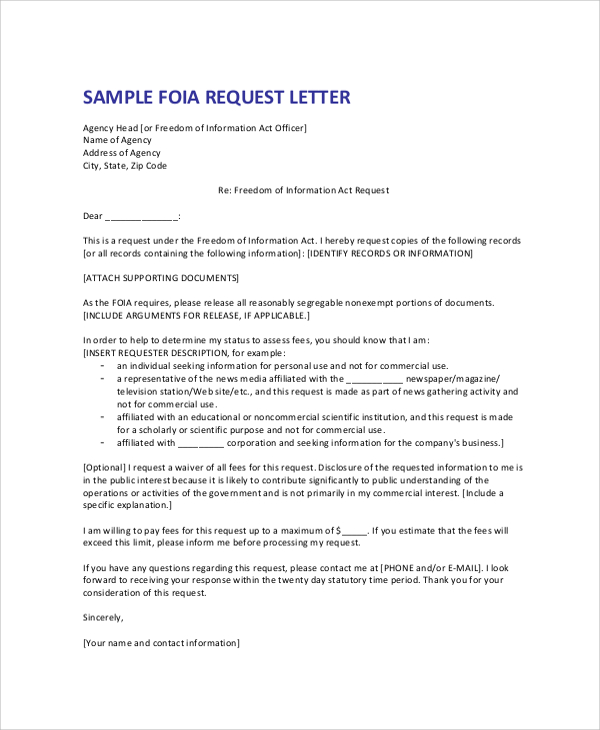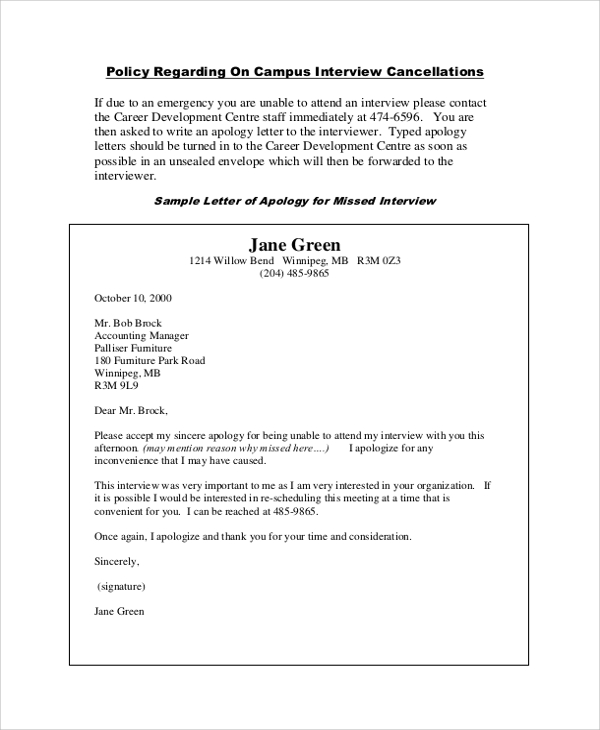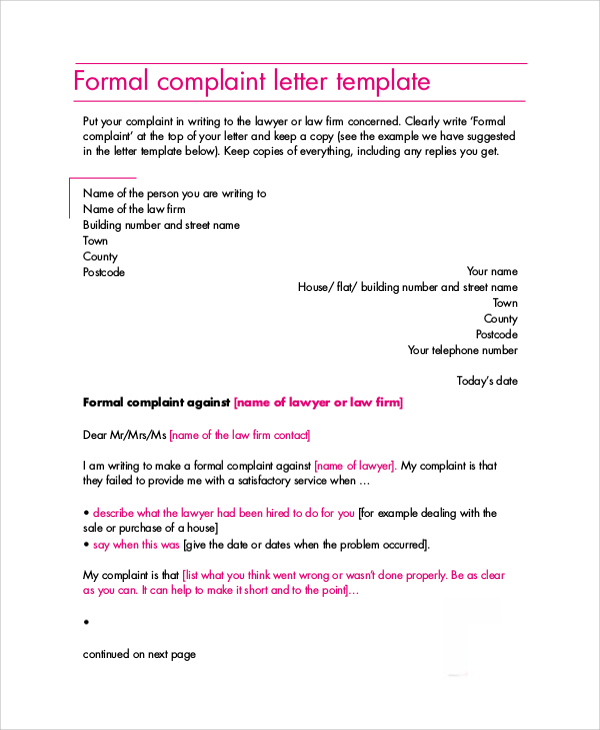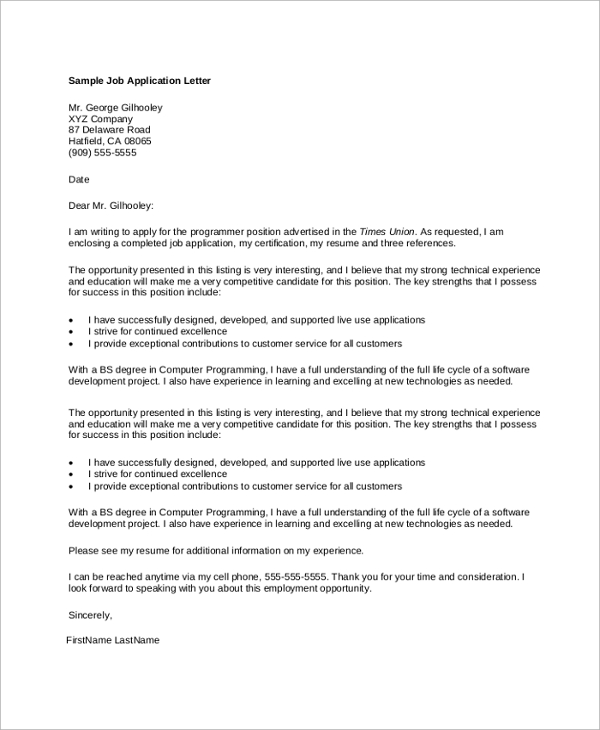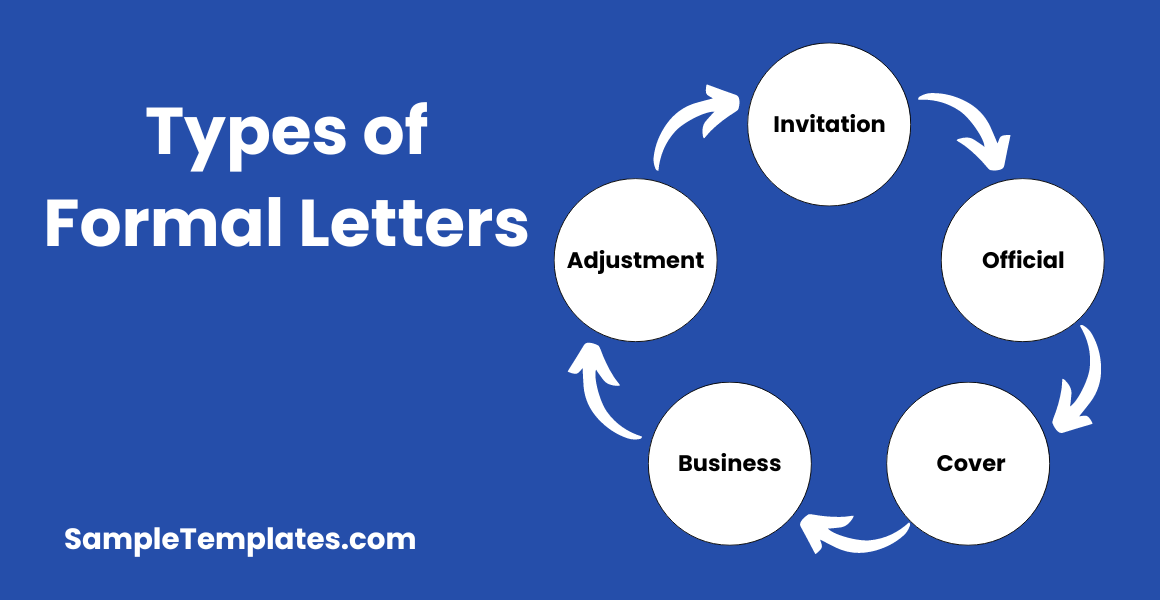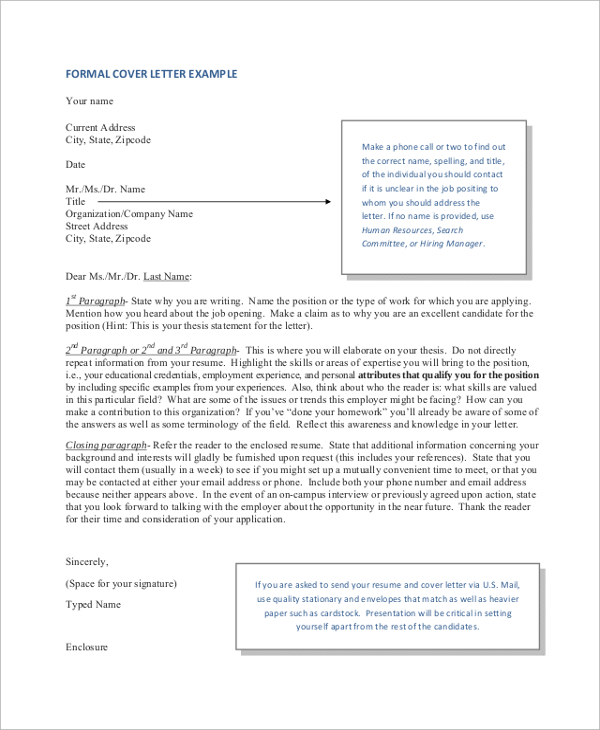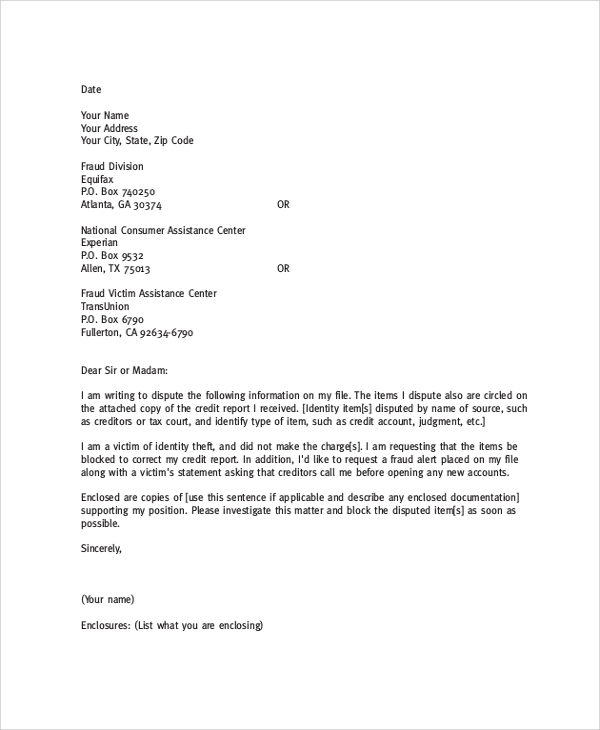A Formal Business Letter is a way of communication between companies, external bodies, and government organizations etc. Employees also write business letters for communication with the employers. Resignation letters, apology letters, thank you letters, and business letters, promotional letters etc are different kinds of letters practiced in the business world.
We provide various kinds of sample letters including Sample Claim Letters, apology letter sample, and resignation sample letters to customers. Download our document and get access to professional sample business letters to write different kinds of letters .
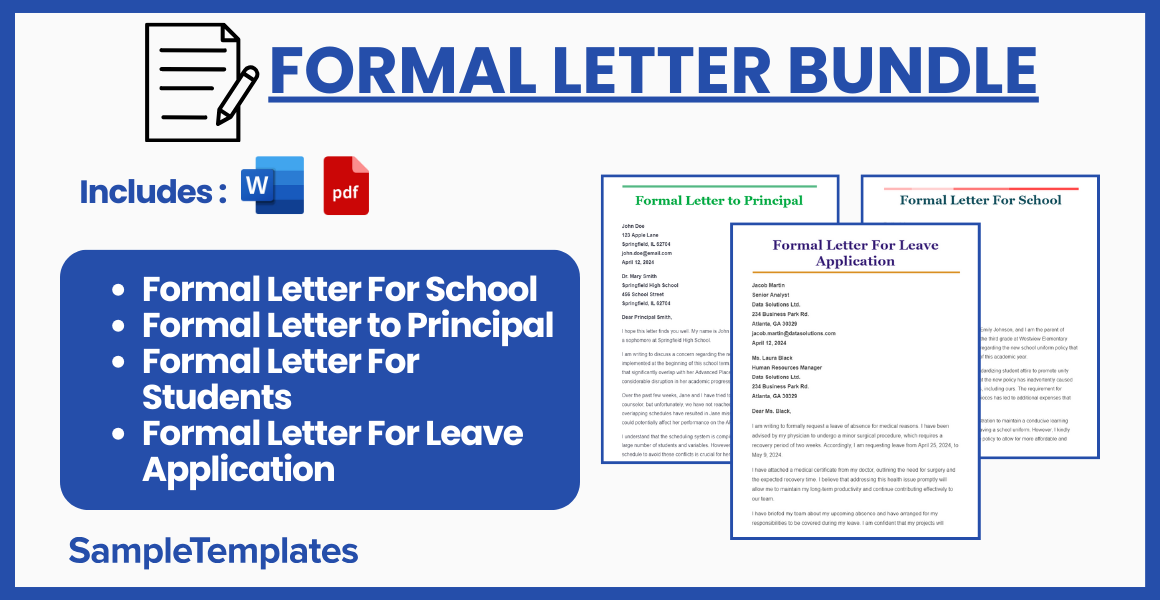
Formal Letter For School
Emily Johnson
123 Maple Street
Education Town, CA, 90210
emily.johnson@email.com
April 10, 2024
Principal Sarah Collins
Westview Elementary School
456 School Lane
Education Town, CA, 90210
Dear Principal Collins,
I hope this letter finds you well. My name is Emily Johnson, and I am the parent of Lucas Johnson, who is currently enrolled in the third grade at Westview Elementary School. I am writing to express my concern regarding the new school uniform policy that was recently implemented at the beginning of this academic year.
While I understand the intention behind standardizing student attire to promote unity and reduce distractions, I have observed that the new policy has inadvertently caused significant financial strain on several families, including ours. The requirement for specific brands and the number of uniform pieces has led to additional expenses that were not anticipated.
I appreciate the efforts of the school administration to maintain a conducive learning environment and I support the principle of having a school uniform. However, I kindly request that the school consider revising the policy to allow for more affordable and accessible uniform options. This adjustment could significantly alleviate the financial burden on families while still achieving the desired objectives of the uniform policy.
Moreover, I believe that involving parents in the decision-making process for such policies could foster a stronger sense of community and understanding between the school administration and the families it serves. To this end, I propose organizing a meeting between interested parents, members of the school board, and the administration to discuss and explore possible amendments to the uniform policy.
I am confident that together, we can find a balanced solution that respects the financial constraints of families and upholds the school’s values and standards. I am more than willing to volunteer my time to assist in this process and to gather feedback from other parents if deemed helpful.
Thank you for considering my request and for your dedication to creating a nurturing and supportive educational environment for our children. I look forward to your response and am hopeful for a constructive dialogue on this matter.
Sincerely,
Emily Johnson
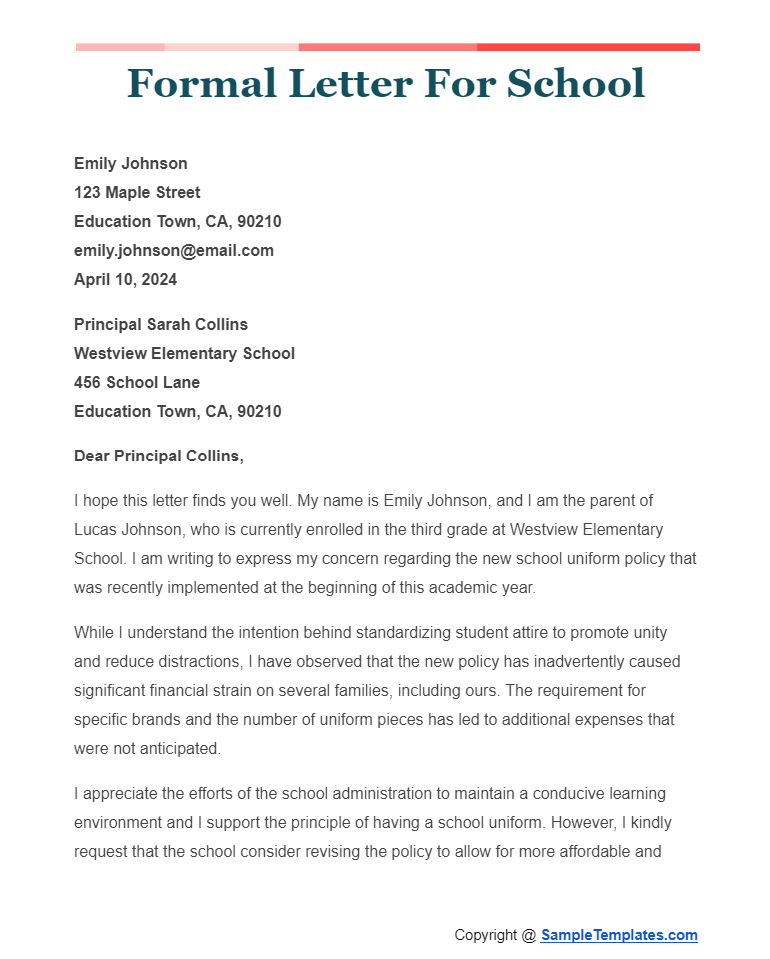
Formal Letter to Principal
John Doe
123 Apple Lane
Springfield, IL 62704
john.doe@email.com
April 12, 2024
Dr. Mary Smith
Springfield High School
456 School Street
Springfield, IL 62704
Dear Principal Smith,
I hope this letter finds you well. My name is John Doe, and I am the father of Jane Doe, a sophomore at Springfield High School.
I am writing to discuss a concern regarding the new scheduling system that was implemented at the beginning of this school term. Jane has been assigned to classes that significantly overlap with her Advanced Placement courses, which is causing a considerable disruption in her academic progress and overall stress levels.
Over the past few weeks, Jane and I have tried to address this issue with her guidance counselor, but unfortunately, we have not reached a satisfactory resolution. The overlapping schedules have resulted in Jane missing important coursework, which could potentially affect her performance on the AP exams.
I understand that the scheduling system is complex and involves accommodating a large number of students and variables. However, I believe that adjusting Jane’s schedule to avoid these conflicts is crucial for her academic success this year. I am writing to respectfully request your intervention to see if a more favorable solution can be arranged.
Thank you very much for your attention to this matter. I am hopeful that with your help, we can find a resolution that allows Jane to continue to excel in her studies. Please feel free to contact me at your earliest convenience at the phone number or email address provided above. I am looking forward to your response.
Sincerely,
[Your Signature (if sending a hard copy)]
John Doe
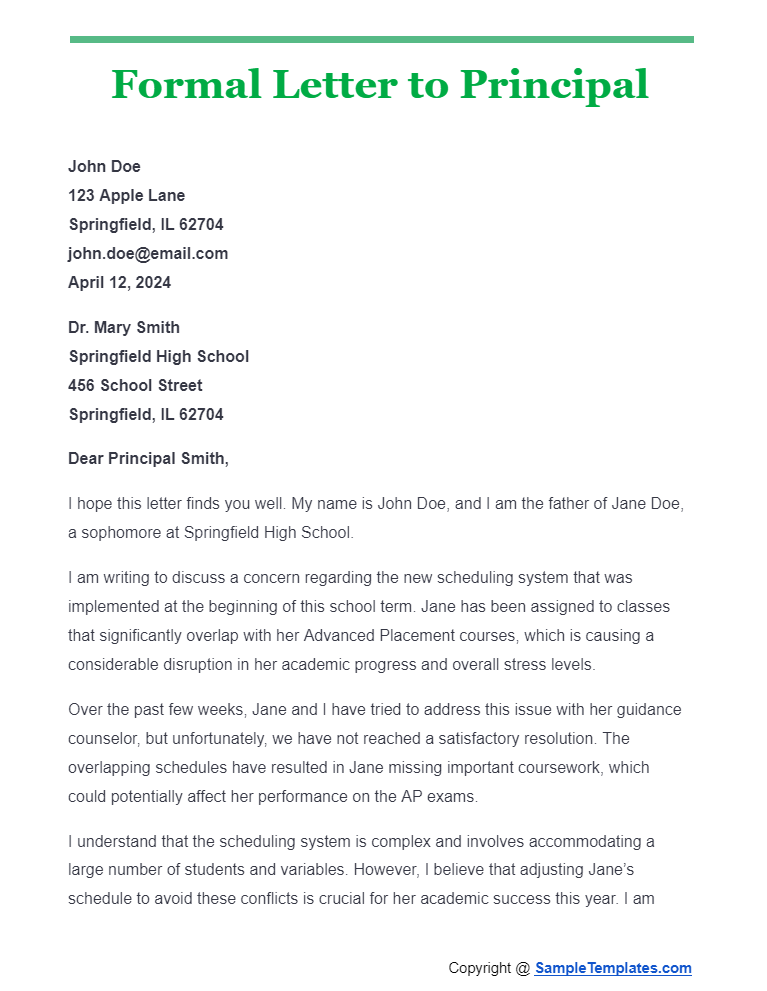
Formal Letter For Students
Emily Chen
789 Maple Street
Riverdale, NY 10471
emily.chen@studentmail.com
April 12, 2024
Dr. James Taylor
Riverdale High School
101 Education Blvd
Riverdale, NY 10471
Dear Dr. Taylor,
I hope this letter finds you in good health and spirits. My name is Emily Chen, a junior at Riverdale High School, and I am writing to bring to your attention a concern regarding the availability of science lab equipment in our chemistry classes.
Throughout this academic year, I have observed and experienced difficulties in accessing adequate lab equipment during class experiments. The shortage of essential items such as Bunsen burners and beakers has often compelled us to either wait for long periods during lab sessions or to work in larger groups than is pedagogically effective. This has considerably limited our hands-on learning experience and our ability to complete experiments as intended in our syllabus.
Recognizing the importance of practical experiments in understanding complex scientific concepts, I respectfully request that the school administration consider increasing the budget allocation for science lab resources. Ensuring that sufficient and functional equipment is available to all students will undoubtedly enhance our learning experience and academic performance.
Thank you for considering this request. I am confident that with your support and understanding, we can improve our educational resources, benefiting all students at Riverdale High School. I am looking forward to your response and am available to discuss this matter further at your convenience.
Yours sincerely,
Emily Chen
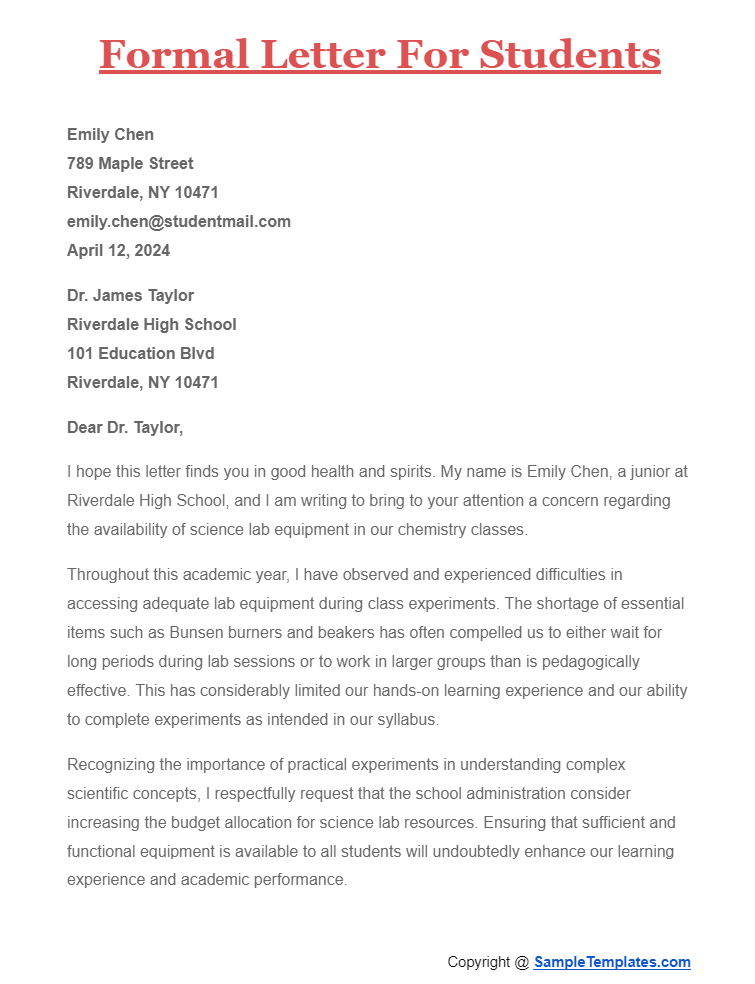
Formal Letter For Leave Application
Jacob Martin
Senior Analyst
Data Solutions Ltd.
234 Business Park Rd.
Atlanta, GA 30329
jacob.martin@datasolutions.com
April 12, 2024
Ms. Laura Black
Human Resources Manager
Data Solutions Ltd.
234 Business Park Rd.
Atlanta, GA 30329
Dear Ms. Black,
I am writing to formally request a leave of absence for medical reasons. I have been advised by my physician to undergo a minor surgical procedure, which requires a recovery period of two weeks. Accordingly, I am requesting leave from April 25, 2024, to May 9, 2024.
I have attached a medical certificate from my doctor, outlining the need for surgery and the expected recovery time. I believe that addressing this health issue promptly will allow me to maintain my long-term productivity and continue contributing effectively to our team.
I have briefed my team about my upcoming absence and have arranged for my responsibilities to be covered during my leave. I am confident that my projects will continue smoothly in my absence, and I am committed to resuming my duties immediately upon my return.
Please let me know if you need any further information or if there are forms and procedures I should complete before my leave begins. Thank you for considering my request.
Sincerely,
Jacob Martin
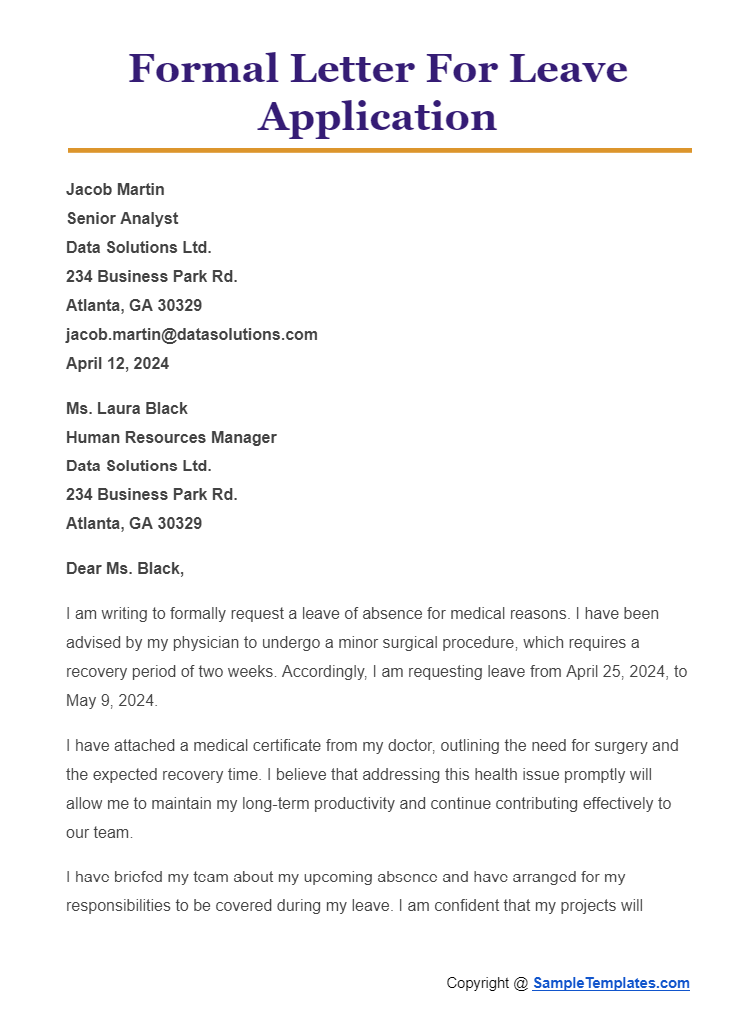
Browse More Templates On Formal Letter
Formal Letter Format Template
Formal Letter of Interest Template
How To Write a Formal Letter
Writing a formal letter requires attention to format, tone, and structure. Whether you’re writing to a company, a government official, an academic institution, or any other formal recipient, it’s important to be clear, concise, and respectful. Here’s a step-by-step guide to help you craft an effective formal letter:
1. Choose the Right Format
- Sender’s Address: Start with your address in the top left corner of the page.
- Date: Below your address, write the date of writing the letter.
- Recipient’s Address: Leave a space after the date and list the recipient’s name, title, and address.
- Salutation: Use a formal greeting like “Dear Mr./Ms. [Last Name],” or “Dear [Title/Position],” if you do not know the name.
2. Write the Opening Paragraph
- Start with a polite introduction stating the purpose of your letter succinctly. Keep this section brief and to the point.
3. Develop the Body
- First Paragraph: Outline the main point of your letter, providing any necessary context.
- Middle Paragraph(s): Here, go into detail about your request or the information you are conveying. Provide all necessary details that the recipient needs to follow up on your letter.
- Final Paragraph: Begin to wrap up your letter. Summarize your points briefly and state what action you hope the recipient will take.
4. Conclude Your Letter
- End with a courteous closing statement, such as “Yours sincerely,” if you know the name of the person you are writing to, or “Yours faithfully,” if you do not.
- Leave four lines empty for your signature, then type your full name. If you’re submitting electronically, you may include an electronic signature or typed name only.
5. Add a Subject Line (if necessary)
- For some formal letters, like business or resignation letters, it’s appropriate to include a subject line between the recipient’s address and the salutation to summarize the letter’s intent.
6. Proofread and Edit
- Check for any grammatical, spelling, or punctuation errors. Ensure your language is formal and appropriate for the context. Avoid contractions (e.g., use “do not” instead of “don’t”) and slang.
7. Attach Supporting Documents (if any)
- Mention any attachments included with your letter in the body or below your signature as “Enclosure: [Document Name].
Formal Letter Example Template
Formal Demand Letter Template
Formal Offer Letter For Real Estate Template
When to Use a Formal Letter Format
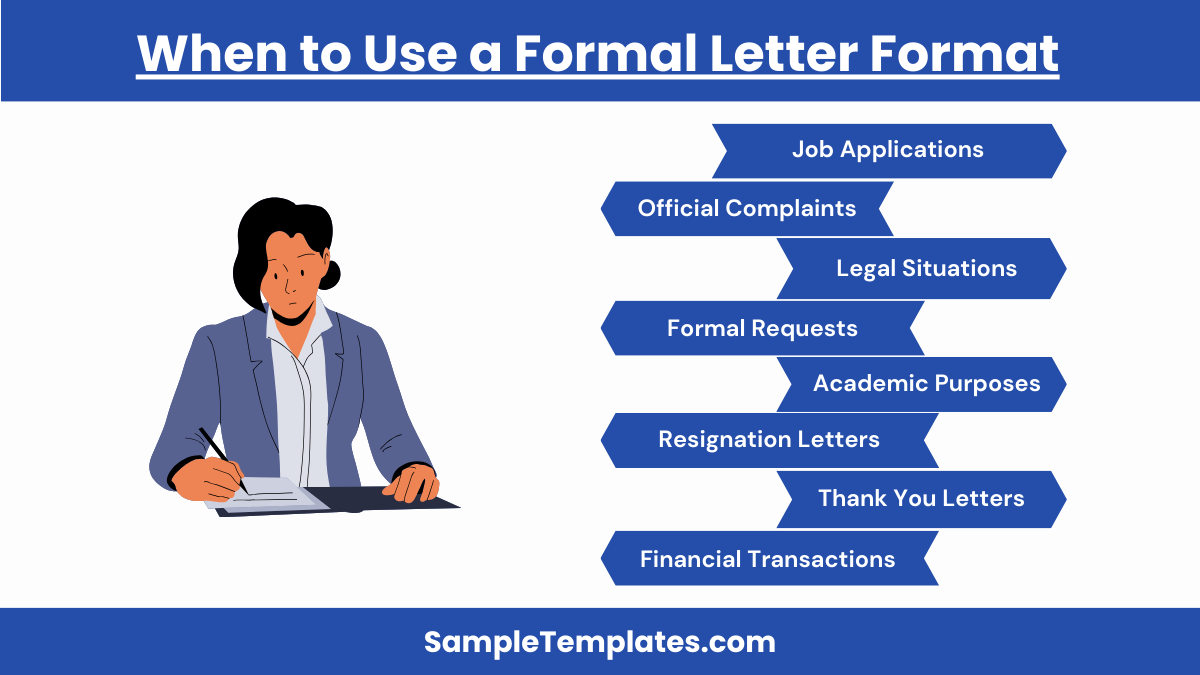
Formal letter formats are used in a variety of situations that require a professional tone and structured communication. Here are some of the most common scenarios where a formal letter format is appropriate:
- Job Applications: When applying for a job, cover letters should be formal, addressing the hiring manager or the HR department, outlining your qualifications and interest in the position.
- Business Correspondence: Communicating with business partners, stakeholders, clients, or vendors often requires formal letters. These can include sample proposals, contract negotiations, official complaints, and more.
- Official Complaints: When lodging a complaint with a company or a government entity about a product, service, or other issues, a formal letter helps ensure your concerns are taken seriously.
- Legal Situations: In legal contexts, such as addressing a lawyer, court, or regarding legal procedures, formal letters are necessary to convey the seriousness and specific details of the issue.
- Formal Requests: This might include requesting information, applying for permits, funding, or authorizations from government bodies or educational institutions.
- Academic Purposes: Writing to faculty, administrators, or to request academic records or recommendations often requires a formal approach.
- Resignation Letters: When resigning from a job, a formal resignation letter is a professional way to announce your departure and leave on good terms.
- Thank You Letters: After interviews, meetings, or important business interactions, sending a formal thank you letter can be a polite way to express appreciation and reinforce your interest or partnership.
- Financial Transactions: For loan applications, credit inquiries, or other financial requests, formal letters are often required to provide necessary information and express your request clearly.
Using a formal letter format in these situations helps to convey professionalism, ensures the clarity of your message, and often facilitates a quicker, more appropriate response from the recipient.
Formal Resignation Letter Template
Learn the best way of writing decent and professional resignation letters using formal resignation letter sample document. Read the sample formal letter example by downloading the template and also get suggestions on how to send resignation letters. Take the reference and write a polite letter to the boss.
Formal Business Letter Template
Formal business letter MS-word document is the simplest way of writing professional business letters. Download the business letter format and get access to the pre-built template. Get access to 100% customization and make necessary changes. Professional copywriting, effective customization and decent tone make it a best business letter template. Send it either via email or take out a print to the courier.
Formal Request Letter Template
In the corporate world, request letters are used for various purposes like appointments, holidays, and jobs etc. Each request letter writing involves unique format. Download Formal request letter PDF document for reference and write professional request letters.
Tips For Writing a Formal Letter
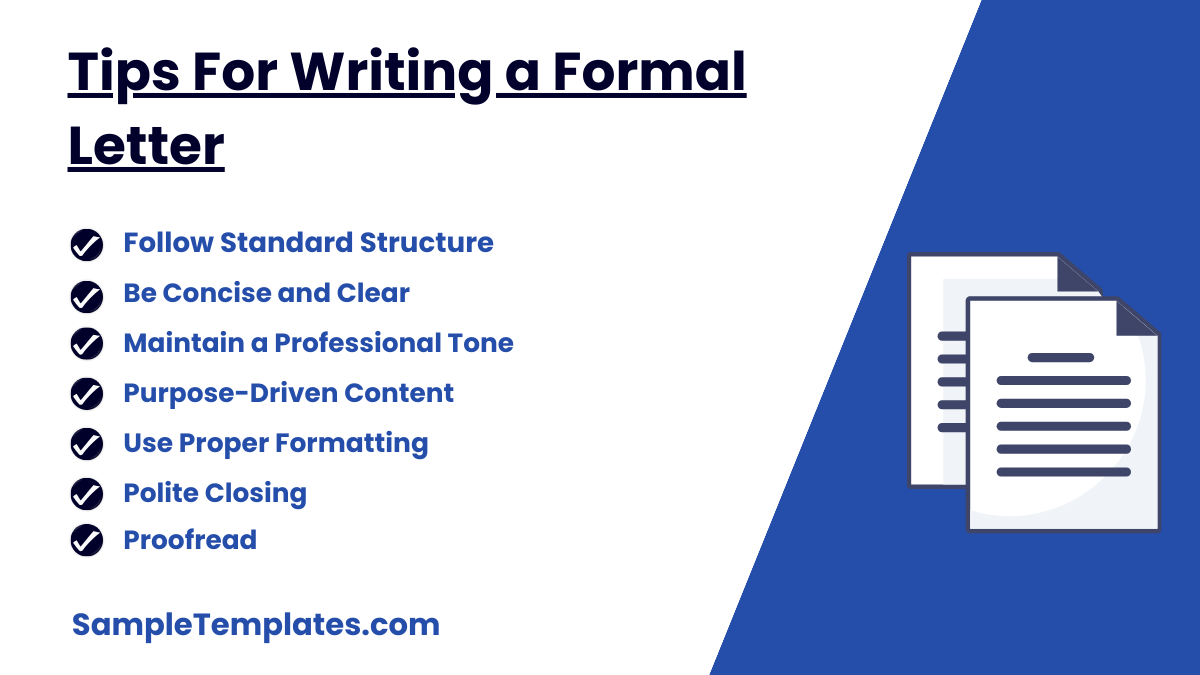
Writing a formal letter effectively involves attention to detail, proper formatting, and clear communication. Here are some essential tips to help you write a formal letter that is professional and effective:
1. Follow Standard Structure
- Header: Include your contact information at the top, followed by the date, and then the recipient’s name and address.
- Salutation: Use a formal greeting such as “Dear Mr./Mrs./Dr. [Last Name],” or if the recipient’s name is unknown, “Dear Sir or Madam,”.
2. Be Concise and Clear
- Clarity: Use simple and direct language to ensure your message is clear. Avoid jargon or overly complex sentences.
- Conciseness: Keep your letter succinct. Make your point clearly and avoid unnecessary details.
3. Maintain a Professional Tone
- Respectfulness: Always maintain a respectful tone, even if you are writing a complaint or a difficult message.
- Formality: Avoid slang, contractions, and overly casual language. Stick to a formal tone to reflect professionalism.
4. Purpose-Driven Content
- State Your Purpose Early: Mention the purpose of your simple letter in the first paragraph to orient the reader immediately.
- Relevant Details: Include all necessary information relevant to the purpose of your letter. Be specific about dates, names, and other pertinent details.
5. Use Proper Formatting
- Paragraphs: Use paragraphs to organize your thoughts clearly. Each paragraph should have a clear point and should support the overall purpose of the letter.
- Alignment: Typically, formal letters should be left-aligned and single-spaced with a space between paragraphs.
6. Polite Closing
- Closing Statement: End with a polite closing statement such as “Yours sincerely,” or “Respectfully,” if the name of the person is known. If not, “Yours faithfully,” is traditionally used.
- Signature: Leave space for your signature followed by your typed name and title if applicable.
7. Proofread
- Review for Errors: Proofread your letter for spelling, grammar, and punctuation errors. Consider having another person review it as well to catch any mistakes you may have missed.
- Check Tone and Clarity: Ensure that your tone is appropriately formal and your points are clearly expressed.
8. Include Contact Information
- Follow-up Details: Provide a way for the recipient to contact you if necessary. Include your phone number or email address in the header or under your signature.
By adhering to these guidelines, you can write a formal letter that effectively communicates your message in a professional manner.
Formal Apology Letter Template
If you miss an interview or need to apologize for an incident then write an apology letter. Apology letter writing should be formal that should express your emotions or reasons effectively. So, download formal apology letter sample and learn the smartest way of writing formal apology letters.
Formal Complaint Letter Template
Formal Job Application Letter Template
Formal Cover Letter Template
Formal Follow up Letter Template
Purpose of using Formal Letters
Companies use Formal Letters for product/service marketing. Business letters are used as a tool for confidential information exchange among companies and organizations. Everything is a writing work in the corporate sector. So, businesses ask employees to write written request letter and resignation letters etc to keep it as a record. So, a business letter sample is an important stuff.
Our sample business letters are written by corporate scholars having excellent English writing skills. Take reference from sample notice letters and other business letters and do write keen and formal business letters without facing a single issue.
Which is the correct format for a formal letter?
Sender’s address, date, recipient’s address, salutation, body (introduction, main content, conclusion), complimentary close, signature, typed name.
How do you write a formal letter expression?
Use clear, concise language, formal greetings and closings, and maintain a respectful tone throughout.
What sentences begin a formal letter?
“I am writing to inquire about…” or “I wish to express my interest in…” are common openings.
What are the 3 formats of a formal letter?
Block format (all text left-aligned), modified block format (date and closing right-aligned), and semi-block format (text left-aligned, paragraphs indented).
How do you write a formal and official letter?
Begin with sender’s and recipient’s addresses, date, formal salutation, state the purpose, provide supporting details, conclude respectfully, and sign.
What is the last paragraph of a formal letter?
Typically includes a summary of the letter’s purpose, a thank you to the recipient for their time, and a call to action or statement of expected follow-up.
In conclusion, a well-written formal letter demonstrates professionalism, clarity, and respect for the recipient. It leaves a lasting impression and can effectively convey your message or request. End with a courteous closing statement to leave a positive impression.
If you have any DMCA issues on this post, please contact us!
Related Posts
Sample Job Application Cover Letter Templates
FREE 18+ Sample Thank You Letter to Employer in PDF | MS Word | Pages | Google Docs
FREE 4+ Sample Faculty Position Cover Letter Templates in PDF | MS Word
Sample Business Meeting Invitation Letter Templates
FREE 12+ Teacher Cover Letter Samples in PDF | MS Word | Google Docs | Pages
FREE 6+ Sample Love Letters For Her in MS Word
FREE 7+ Sample Romantic Love Letter Templates in MS Word
FREE 24+ Sample Academic Cover Letter Templates in MS Word | PDF
Query Letter Samples
Sample Letters of Request
Enclosure Cover Letter Samples & Templates
Formal Request Letter Templates
FREE 9+ Formal Invitation Letter Templates in PDF | MS Word | Apple Pages
FREE 10+ Different Types of Resignation Letters [ Tips, How to Write It ]
FREE 5+ Investigation Outcome Letter Samples in PDF | DOC
